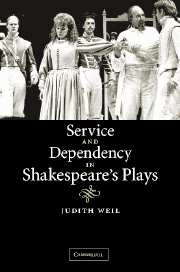3 - Wives and servants
Published online by Cambridge University Press: 22 September 2009
Summary
Because service has so often coincided with coming of age in western societies, our languages contain terms which refer simultaneously to young people and to servants. This is not the case with the English word “wife” nor with the concept. Although at law an early modern wife might have been regarded as having few more rights than a servant, advice manuals often object to husbands who treat their wives like servants. Robert Cleaver emphatically criticizes husbands “that through evill and rough handling, and in threatning of their wives, have and use them not as wives, but as their servants.” William Gouge protests that “Such as will not give a blow to a servant, care not what load they lay upon their wives.” Wives are often allotted greater responsibilities and control over property; both wives and servants can admonish, Thomas Gataker decides, but the wife “may much more.”
Recent scholarship on households and families has stressed the degree to which patriarchal supervision must have been eased as wives tacitly negotiated strict rules on obedience. Without such de facto adaptation, it would be difficult to explain why wives apparently had considerable freedom to work, do business, run estates, go to market, or meet with their friends. One of the chief responsibilities of the wife would have been the management and training of servants. Because wives spent much of their time in the company of servants, their roles must often have overlapped and interacted.
Information
- Type
- Chapter
- Information
- Service and Dependency in Shakespeare's Plays , pp. 50 - 79Publisher: Cambridge University PressPrint publication year: 2005
